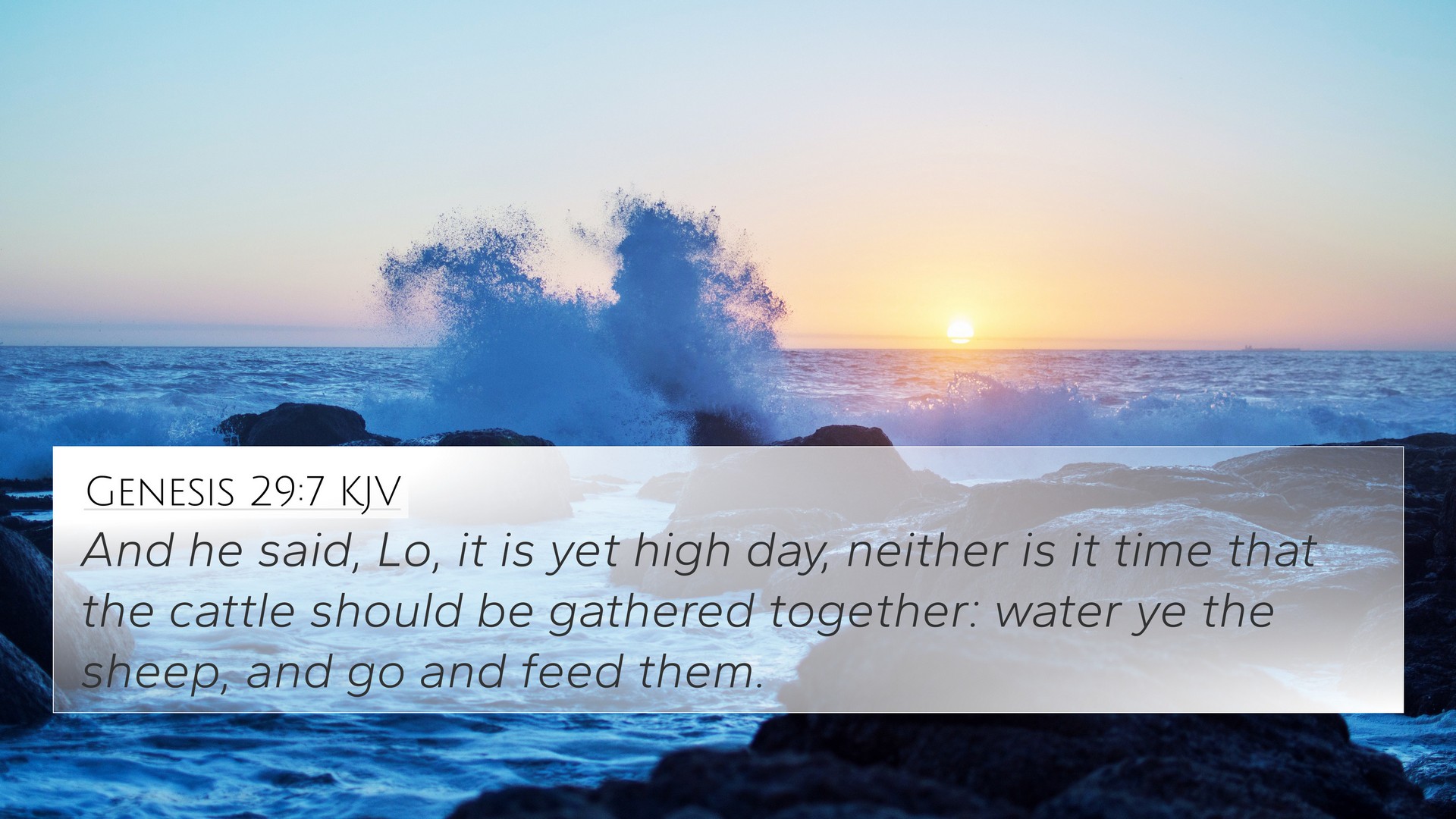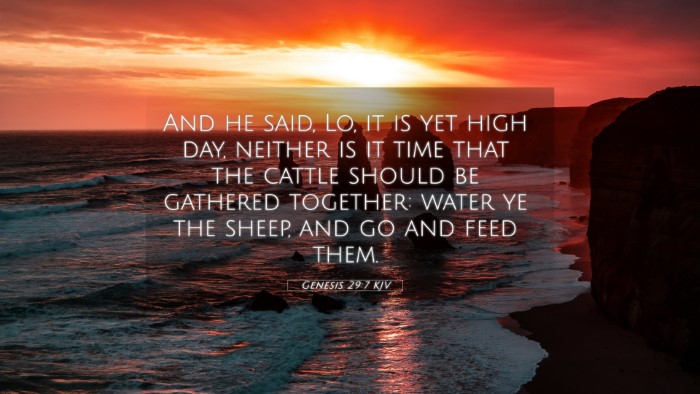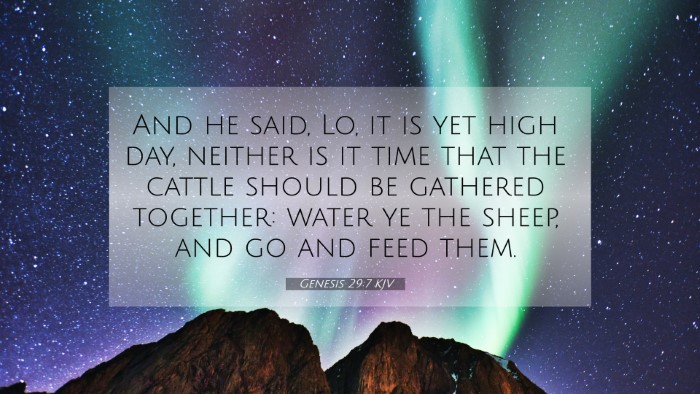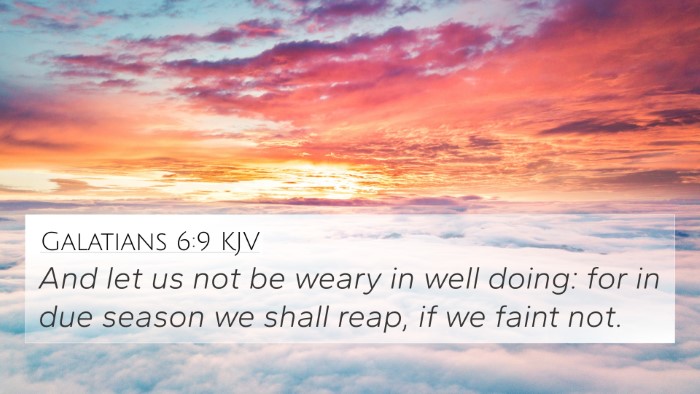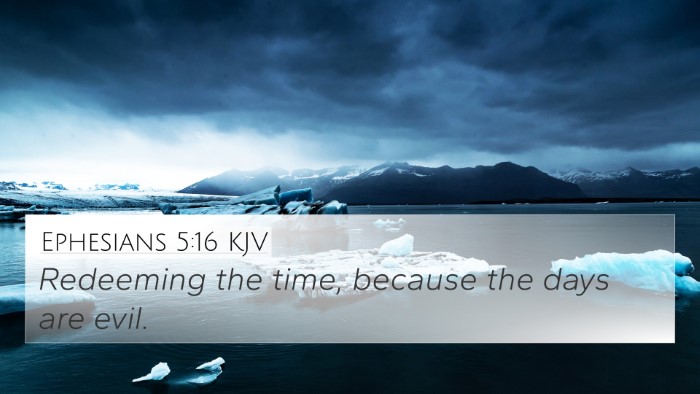Understanding Genesis 29:7
Verse: "And he said, Lo, it is yet high day, neither is it time that the cattle should be gathered together: water ye the sheep, and go and feed them."
Genesis 29:7 presents an insightful moment in the life of Jacob upon arriving in Haran. This verse reveals Jacob's understanding of the agricultural practices of the region, reflecting both his pastoral experience and his leadership qualities.
Contextual Analysis
This moment occurs after Jacob's long journey from Canaan and his arrival at a well in Haran, where he first meets Rachel, Laban's daughter. Jacob's interaction here serves as a precursor to the profound relationships that will develop in the narrative, highlighting themes of labor, provision, and divine guidance. The commentaries from Matthew Henry, Albert Barnes, and Adam Clarke provide valuable insights into this passage.
Commentary Insights
-
Matthew Henry:
Henry emphasizes Jacob's practical wisdom in assessing the time for feeding the sheep rather than gathering them, thereby demonstrating his ability to manage resources effectively. He perceives this as indicative of God's providential care in guiding Jacob towards his future.
-
Albert Barnes:
Barnes focuses on how Jacob's directive showcases the importance of timing in pastoral life—evidence of his experience and consideration for the well-being of the flock. He notes that this command also assists in revealing Jacob's character as a leader.
-
Adam Clarke:
Clarke points out that Jacob’s role as a shepherd is not only reflective of his family's heritage but is also a metaphor for his future responsibilities within God’s covenant promise. This strengthens the idea of divine purpose in Jacob’s life, preparing him for greater leadership.
Thematic Connections
Genesis 29:7 encapsulates themes central to much of biblical narrative, portraying leadership, responsibility, and the shepherd's heart. This is further enriched when cross-referenced with other scripture passages.
Bible Verse Cross-References
- Psalm 23:1-2 - The Lord as shepherd, affirming care and guidance.
- John 10:11 - Jesus as the good shepherd, paralleling the pastoral responsibility Jacob exhibits.
- Exodus 3:1 - Moses tending sheep, indicating the preparation of leaders through shepherding.
- 1 Peter 5:2 - A call to shepherd the flock of God, building on the theme of pastoral leadership.
- Genesis 30:31 - Insights into Jacob's continuing interactions with livestock and their importance.
- Matthew 9:36 - Jesus’ compassion for the harassed and helpless, framing the pastoral role in a New Testament context.
- Jeremiah 3:15 - God's promise to give shepherds after His heart, aligning with Jacob's appointed future.
Connections Between Bible Verses
Understanding Genesis 29:7 benefits greatly from exploring its connections to other scriptures. These linkages offer a comprehensive view of shepherd leadership throughout the Bible.
Practical Applications
For modern readers, this verse and its surrounding context present a model for being attentive to timing and stewardship in our own lives. Jacob's directive can serve as a metaphor for responsibly managing our resources—spiritual, emotional, and physical.
Tools for Bible Cross-Referencing
Engaging with texts like Genesis 29:7 through tools for Bible cross-referencing such as:
- Bible concordances
- Bible cross-reference guides
- Cross-reference Bible studies
can help deepen understanding through thematic exploration.
Conclusion
Genesis 29:7 stands as a rich verse depicting Jacob's insight as he tends to the flock. It invites theological reflection and practical application for stewardship in various aspects of life, underscoring the connections and threads that weave through Scripture. Exploring these connections furthers our understanding, deepens our faith, and provides models for contemporary living.
